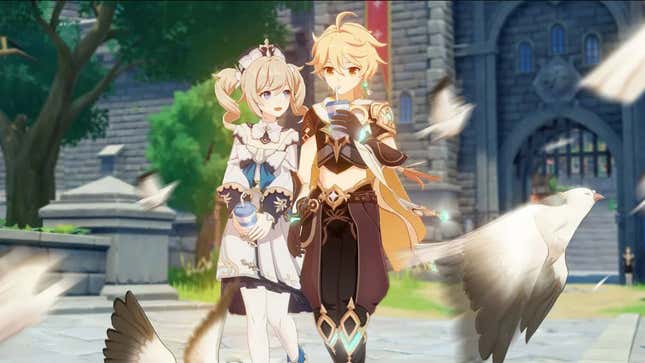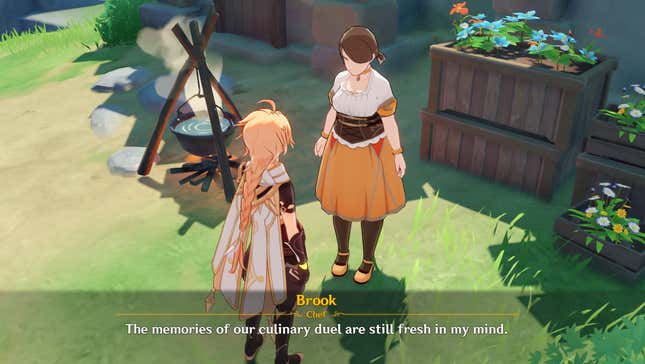
Reused NPCs. An environment you’ve already spent dozens of hours in. Contrived progress gating based on time. On paper, Genshin Impact’s current event, the Windblume Festival, sounds like it’s scraping the bottom of the barrel. In reality it’s a chill yet inventive exercise in making an in-game holiday feel like, well, an event. But it desperately wants players to keep coming back, in a way that serves as a microcosm of Genshin Impact’s biggest problem.
The Windblume Festival takes place in Genshin Impact’s first major city, Mondstadt. It’s basically Valentine’s Day, but with a big(ger) emphasis on drinking. This tracks, given that it’s an annual celebration of a god named Barbatos, who regularly hangs out with your party disguised as Venti, a bard with a drinking problem. The holiday has a pretty simple core conceit: People try to find ways to do something special for those they care about. Often, this involves the Windblume, a flower that...could be any number of other flowers; nobody is really sure.
The event opens up a series of new quests, but where other games would opt for pomp and circumstance to lure back the disinterested masses, Genshin Impact—buoyed, admittedly, by over $1 billion in revenue—took a less flashy, more confident tack. The quests are extremely chill. There is no overarching villain or uncaring doomsday to meet, greet, and defeat. Instead, the central quest focuses on Venti teaching people how to write poetry, while sidequests take the form of vignettes about NPCs, many of whom you’ve already met, living their lives while romance is in the air.
This proves to be a subtly brilliant touch. One quest, for example, is about intrepid monster linguistics expert Ella Musk trying to study in the library while couples with names like “Besotted woman” and “Man doing magic tricks” loudly flirt. It’s pretty funny. Another sees an agent of the villainous Fatui faction beg you to look after a child who’s taken to asking him all manner of questions while her parents are away on “important” Windblume business that the game winkingly suggests is sex. Ultimately, the kid ends up making burnt pancakes for her unlikely BFF, and his cold heart thaws. It’s very sweet.
What these quests and others have in common is that they make heavy use of random background NPCs that you might have talked to—or even done quests for—previously, but who mostly serve as window dressing. Involving them in the festival turns them into people, and it creates the illusion that time is passing in this world. Some of them directly reference your previous exploits; for example, you end up helping out a chef who you previously served as another character’s assistant against in a big cooking competition. She notes that the two are friends now, and they regularly talk shop about recipes and weird ingredients. It’s a clever, wholesome little detail that subtly suggests you’re not the center of this world. You might have been the catalyst for their first interaction, but these characters have their own relationship now.
In general, the event makes smart use of time, even when it’s being really obnoxious about it. Since the Windblume Festival began earlier this month, quests have unlocked in waves, in some cases forcing players to wait hours or days for more content. Obviously, this artificial progress gating exists to encourage players to log in repeatedly—as opposed to knocking everything out in one long session—because developer miHoYo wants people to stick around and spend money. But it also ties the aforementioned illusion of time passing to the actual passage of time in real life. I’ve logged on almost every day for the past week, and it’s felt like joining an ongoing celebration, rather than sighing my way through the sort of static, inconsequential seasonal events I’m used to from MMOs and competitive games like Overwatch. There’s a sense of liveliness to it. Things are happening.
It all reminds me, in an abstract sense, of Dragon Age II. While not well-received when it first came out, BioWare’s RPG sequel shined when it focused on the impacts of time’s ravages on a single, lived-in location. This allowed it to depict the consequences of your choices, but on a micro level, it also meant that character relationships evolved more naturally than they do in other games. Genshin Impact applies that still-underutilized approach to RPG storytelling to a live game, which is a pairing that makes a lot of sense.
But it’s also pernicious. These systems are not so subtly the lures at the end of the barbed gacha line. The Windblume Festival is paired with a special limited-time “banner” that makes Venti slightly less obscenely rare than he normally is. Of course, after hanging out with him and seeing him at his most charming, you’re gonna want to add him to your party—even if that means spending a few dollars here or there to give yourself some extra chances. On top of that, the entire Windblume event will wrap up on April 5, which means that players are pressured to log in or risk missing out. This in addition to the game’s regular daily “commission” system, which further encourages players to log on regularly whether there’s an event going or not, not to mention other mechanics that perform similar functions like story keys and original resin. It feels in some ways like the Windblume Festival’s clever time-based ideas exist first and foremost to hook players who’d otherwise be happy to move on, and the charming storytelling is just a byproduct.

That’s been the rub with Genshin Impact for a while now: If you just chill out and experience it at your own pace, it’s one of the more enjoyably laid-back adventures you’ll find in video games. But if you think about the gacha systems underlying it or dive into its grindy deep end, it becomes paradoxically stressful. This tension is ever-present; yesterday, after returning from a Genshin-packed weekend feeling refreshed, I read our piece summing up the game’s first six months and was gripped by anxiety every time I hit a line about players reacting to basically anything, or the endgame that I’m rapidly approaching. It’s all strife, conflict, and demands for new mechanics that will make this game stretch on forever. The game, as an object and centerpiece of discussion, feels incredibly at odds with its own content—a quiet island paradise surrounded on all sides by storms. I’m not just blaming players for this. Games like these aren’t meant to last forever, but that hasn’t stopped miHoYo from trying. It’s natural, then, that players would sense this intention and react in kind.
It’s heartbreaking that we’ve reached such a cutthroat point that games, from a structural standpoint, do not trust players to take a break and come back—and that both companies and communities have become complicit in the idea of individual games as be-all, end-alls that provide everything for many while wringing every last cent out of a dedicated few. I can’t imagine playing Genshin Impact the way miHoYo seemingly wants me to play it: logging in every day, trying to collect every character, min/maxing my party, grinding endlessly while waiting impatiently for new content to arrive. That sort of uncomfortable urgency just feels so wrong in the face of a game that narratively understands the value of kicking back and seeing what the world brings you. That’s the thing about time: You can’t demand for it to pass. You have to let it. I wish Genshin Impact understood that as well as...Genshin Impact.
.